 "He Breathed on Them" Those words are from Easter Evening, written in the Book of John (John 20:22). Usually we pay attention to all the other parts. Jesus rose from the dead and began to show Himself to His disciples: to Mary Magdalene; the Two on the way to Emmaus; to Peter; and then the disciples in the upper room. They were huddled together in fear, the doors were locked, they had heard the stories but were not sure what to believe. And then Jesus was there, right there among them. He said "Peace be with you and showed them His hands and His side. And He sent them to bring forgiveness and the Gospel of salvation to the world. But there is this one little part. "And when He had said this, He breathed on them and said to them, "Receive the Holy Spirit ..." (John 20:22) That's a very vivid image this year. We have had to think about masks, social distancing, sheltering at home, and so many things shut down. But, "He (Jesus) breathed on them". When I teach about this in Confirmation Class I always try to remember to bring garlic. Because this is not describing Jesus standing at the other end of the room and going, "Haa" One of my teachers told our class at Seminary how people in the Middle-east like to be so much closer to each other when they talk. It can be uncomfortable for someone from our part of the world. Then he said that when they want to speak a blessing they will get in real close and "bathe you in their breath." As the blessing goes on you will sometime have to inhale, and then you will find out whether they like garlic! When you hear the verse, "He breathed on them" do not think of Jesus standing far off. He is being close, giving a blessing and saying, "Receive the Holy Spirit." And, by the way, the word for Spirit and the word for breath is the same in Hebrew. We are in the middle of a time of being so careful of breath, and closeness, and still worried about getting something from someone else's breath. And then we read, Jesus "breathed on them". Exactly! The scientists tell us there are bits of virus we could "get." It could be dangerous. It could bring death. What Jesus breaths on His disciples is bits of the Word of God. "Receive the holy Spirit." "If you forgive the sins of anyone, they are forgiven ..." (John 20:23) Bits of the Word of God, given by the breath and words of Jesus bring life. These are pieces of the God's Eternal Word. They get into the soul and they bring life. They get into the deepest parts of our heart and they change us. When that Word takes hold of us there is a dying and a rising. "Do you not know that all of us who have been baptized into Christ Jesus were baptized into His death? We were buried therefore with Him by baptism into death, in order that, just as Christ was raised from the dead by the glory of the Father, we too might walk in newness of life." (Romans 6:3-4) And then, with the words and the Spirit of Jesus within them, Jesus prepares them to spread His Gospel. Fifty days later came the gift of the Holy Spirit, giving languages and spreading the Gospel. Everyone who caught it (3,000 that day) was changed. The disciples went out breathing out the breath Jesus had breathed into them, breathing out bits of the eternal Word of God. It continued to spread, person to person all over the world, bringing faith and eternal life everywhere. And it hasn't been stopped yet! Lord Jesus, breathe Your Word into my soul, and guide me by Your Spirit. I pray, that the verses and promises all over in Your world would work their way all through me, so my thinking, feeling, desires, and attitudes may be changed and formed according to Your will. Give me devotion to You, compassion for my neighbor, patience and grace in times of conflict, faith in Your wisdom and power, and winsomeness in my words. May I always see my neighbor as one loved by You and made in Your image; that I may serve Your kingdom, as You bring together the Great Gathering of souls into eternal life. Amen.
0 Comments
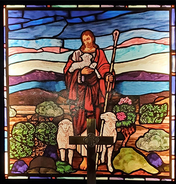 The Tasty Word There is "The Simple Word" of God, the "Means of Grace" that the Holy Spirit speaks into our souls to bring us to faith (believing the words and promises of God). There is the "Wet Word," the "Means of Grace" that God pours over us, mixing His own name into the water, so we can have the name of God named over us, along with every word and promise that comes with His name. And there is the "Tasty Word." In the Lord's Supper Jesus puts His words into the bread and wine. Right there at the center of the Supper are the words of Jesus. They give exactly what they promise, "forgiveness of sins." When Jesus speaks His word, this Supper is the feast of salvation. The Bible says, "Oh, taste and see that the Lord is good!" (Psalm 34:8) And it says, "On this mountain the Lord of hosts will make for all peoples a feast ... He will swallow up death forever ..." (Isaiah 25:6-9) And we sing, "This is the Feast of victory for our God ..." This is the Supper of Salvation. When you put it together with Baptism and the Simple Word you find something. God has arranged it so we experience salvation with all our senses. We hear the Word of God. We feel the splash of the water. We see the printed word. We taste the bread and we smell the wine. Every one of the senses are involved. We are invited to a feast; and the background of the Lord's Supper is a feast. It was the Feast of the Passover with the blood of the lamb marking the doors and the next morning heading out of Egypt. It is a celebration of freedom. The celebration surrounds us, and the joy fills our soul. Jesus calls us to His Supper, and this meal fills the senses. He feeds us with the bread of heaven and the wine of joy. We are invited. But here is the best part. Together with bread and wine Jesus says, "Take, eat, this is My Body" and "My Blood shed for you for forgiveness." He gives us Himself. On the tongue? To eat and drink? Just how close does He want to be?
Here comes the sweet part: How close does Jesus want to be with us? After taking all our sin and death on Himself, Jesus gives us His life! It was not enough for Jesus to purchase and win us. He has decided to share with us His life, eternal, glorious and full of blessing. Jesus says, "Because I live you also will live." (John 14:19) Jesus shares His kingdom, and promises to transform our lowly bodies so that they will be like His glorious body. (Philippians 3:21) Certainly that is enough! How can there be any more closeness with Jesus? But there in the Lord's Supper what happens? Jesus takes His own "risen-from-the-dead" body and He puts it on your tongue. He makes you of one body with God who has come into the world. And Jesus takes His "shed-for-you-for-the-forgiveness-of-sins" blood, and He gives it to you to drink; to taste and see that the Lord is good; to swallow forgiveness and have forgiveness become part of your physical being. There in the eating and drinking is the promise, "When He appears we shall be like Him". (1 John 3:2) It is the "Tasty Word." Jesus puts His word and Himself into this Supper, "Given and shed for you for the forgiveness of sins." Whoever believes these words has what the say, exactly as they read, namely "forgiveness of sins." (Small Catechism, Lord's Supper Question 3) Indeed this is the Feast of Salvation, the meal that gives, renews, and strengthens faith. With Jesus' words and promises, "who shall separate us from the love of God? ... neither ... nor ... nor ... nor ... nor ... nor ... nor ... nor ... nor ... nor ... will be able to separate us from the love of God in Christ Jesus our lord." (Romans 8:35-39) Lord Jesus, thank You for this meal, this amazing Supper. You give Yourself! Your body and blood! To feed me; to join Yourself to me; and to carry me into all the blessings You have! How this can be I leave to You. How I can receive such blessings I cannot conceive. But it is Your will to bless, to connect me to You, and to give me an eternity of blessings. Thank You, my Savior and Friend. Let me love You forever; and let me tell of Your love through my life and words. Amen. 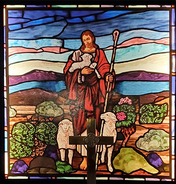 The Wet Word It happened during a Confirmation Class. Students come up with some brilliant insights. Teaching Confirmation is a special treat because young Christians learning about Jesus, about salvation, and about faith can see things from a fresh angle that their teacher never thought of before. And that is thrilling! Some years ago in the middle of class one of the students, Sarah, asked, "So can I call Baptism 'The Wet Word'?" I thought to myself, "That's better than all the other words I was going to use. That's really cool!" "The Wet Word" is a wonderful way of saying it. Right at the center of Baptism is nothing else than the same life-giving, sin-forgiving word of God. The Word is what powers Baptism. "Without the Word of God it is just plain water and no baptism; but with the Word of God it is a Baptism, that is a life-giving water, rich in grace, and a bath of the new birth in the Holy Spirit." (Baptism Question 3) God wants us always to hear and hold on to and treasure His word. He puts all the treasures of salvation in the Word; everything that Jesus earned for us on the cross. And yet, there is something special about Baptism. It is physical, and we get to experience the Words and Promises of God in a very distinct way. God pours His Words and Promises over our heads, and soaks us down with something eternal. How cool is that?! And then while He is busy soaking us down with the life-giving, sin-forgiving "Wet Word" -- at the same time He is packing His Word in through our ears all the way down deep into our souls. Something for the body and something for the soul. Why that might even give you the idea that God wants both parts of us saved and living forever -- the spiritual and the physical parts. It should give you that idea; because that is exactly what God has in mind. "We wait eagerly for our adoption as sons, the redemption of our bodies." (Romans 8:23) And what is that Word of God that He packs into our ears all the way down deep into our souls? It is nothing else than the Name; the name of God Himself. That's how personal it is. Many years ago I wandered into my brother's room. He is the talented one, who was working with clay, molding things and getting them fired in a kiln. He was molding chess pieces and had decided to give each pawn its own personality. He was in the middle of talking with one of them, changing its expression, and carrying on, until he decided that it was a little dry for what he was doing and popped it into his mouth to moisten it. Of course I reacted how I think he wanted. "What are you doing!?" He answered, "You have to put something of yourself into your work." So Jesus did. He put something of Himself into His work; was born and became one of us. Did you know that the human body is about 60 % water? Jesus joined our 60 % water human race. And then at the right time He walked that 60 % water human body down to the Jordan River and was baptized by John. John reacted exactly how Jesus knew he would. "What are you doing!?" And Jesus said, " ... to fulfill all righteousness." (Matthew 3:15) He did not need any additional righteousness. His was perfect. But don't you know, "You have to put something of yourself into your work." Luther called it sanctifying "all waters to be a blessed flood ... a lavish washing away of sin." And Paul said it was "so that we might become the righteousness of God in Him." (2 Corinthians 5:21) My soul redeemed and my body raised, transformed and glorious will be Jesus' own victory that He celebrates on the day when He returns and fulfills the prophecy, "He will exult over you with loud singing." (Zephaniah 3:17) Lord Jesus, thank You for this "wet Word," this thing called Baptism. Thank You that You put Yourself into our human race, to put Your own holiness into us. Thank You for dousing and soaking me with Your Words and Promises, and putting Your name into my ears and into my soul. Remind me day by day of the promises, and how Your promises call and guide me through these days to the day when I will hear You celebrating Your victory in my salvation. Amen. 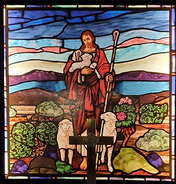 The Simple Word Look inside. Look deep inside and ask a question. In your inner life, as you think through things; or as you decide what it is you want; or as you reflect on the things that you have been through -- how do you do that? How do you think back over your memories or picture what you want to see in the future? The simple answer is "words." That is the stuff of the inner life. It is how you reflect on the world and how you reflect on you. It should not be a surprise that the life of the soul is so completely bound up in words and the word inside us. After all that is how God created the world, by His Word: "Let there be light"; "Let the earth bring forth"; Let us make man in Our image". (Genesis 1:3, 11, 24) God spoke His word over Adam and Eve. He blessed them and said, "Be fruitful and multiply and fill the earth and subdue it ..." (Genesis 1:28) When Adam and Eve fell into sin, what they did was turn away from the Word of God, listening to, "Has God indeed said ...?" (Genesis 3:1) When God began to call them back, He did that through speaking the promise about "the seed of the woman," Jesus. (Genesis 3:15) The Gospel of John describes Jesus' birth as, "The Word became flesh ..." (John 1:14) Jesus is the living, breathing, walking around sermon of God the Father, a sermon with skin. It is the simple Word. God has said that "whoever believes in [Jesus] should not perish but have eternal life." (John 3:16) God has said that "Christ Jesus came into the world to save sinners". (1 Timothy 1:15) And God has said, "The Good Shepherd lays down His life for the sheep." (John 10:11) It is the simple Word, straightforward, unadorned by clever speech or lofty wisdom. (1 Corinthians 2:1-4) In that simple word God speaks straight to our hearts. He tells us of the Savior and promises forgiveness and life. Because it is the simple Word, we are called to simply believe it. That is the pattern all the way through history. From Adam and Eve who believed God's promise of "the Seed of the Woman", Jesus; to Abraham who "believed God, and it was counted to him as righteousness" (Romans 4:3, Genesis 15:6); to David who "also speaks of the blessing"; to Paul who said, "by grace you have been saved through faith ..." (Ephesians 2:8); to Martin Luther who thrilled at salvation "by faith apart from works of the law." (Romans 3:28) All of salvation, complete from beginning to end, comes to us through the Word, because God has put all of His blessings in the Word. And the Word of God is "self-authenticating." That means, it proves itself to the soul that it takes hold of. It causes faith; actually brings into the soul the belief in God who spoke it. The Word of God is life-giving, sin-forgiving, faith-creating, life-renewing, faith-restoring, blessing-bringing, and is eternal in its blessings. Jesus said, "Everyone then who hears these words of Mine and does them will be like a wise man who built his house on the rock. And the rain fell, and the floods came, and the winds blew and beat on that house, but it did not fall." (Matthew 7:24-25) Lord Jesus, fill my soul with Your words. Speak them into my heart day after day, and by Your Spirit sustain my faith each day. Fill my thoughts with the promises You have brought into the world; those promises You have fulfilled in Your own flesh, living, suffering, and rising for me. Hold Your promises before me, bound together with the promise that You will return with eternal life for all Your people. Amen. 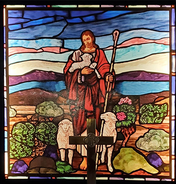 The Word We have a "Means of Grace" theology. That is important. We are now half way between the Day of Ascension and Pentecost. Last Thursday was 40 days after Easter. Jesus appeared to His disciples over those 40 days, showing and proving to them that He truly is Risen! Forty days after Easter Jesus ascended into heaven, telling the disciples to remain in the city until they were clothed with power from on high. It has been 5 days. There are 5 more days until Pentecost. During their waiting, the disciples were "continually in the temple" worshiping and hearing the words of the Old Testament. When they were not in the Temple, they were devoting themselves to prayer and studying the Word of God. That is the pattern. Guided by the Holy Spirit they were searching out the prophecies about Jesus. It was a time to prepare The days would come when the Holy Spirit would move them out to tell the Gospel about Jesus. The words of prophecy they were reading would be the words of prophecy they would share. But there is something else happening. We have a "Means of Grace" theology. There are specific things that God uses to create and strengthen our faith. They are the "Means of Grace" and the tools of the Holy Spirit. It works like this.
The Word of God is living and active. When God sends out His Word, it does what He has commanded. (Isaiah 55:11) The heart and center of the word of God is the teachings about Jesus, about forgiveness through His cross, about victory through Jesus rising from the dead, and how there is salvation in Jesus for all who believe in Him. When God speaks His grace-filled, forgiving and life giving words, we want to be there. We want to hear them. We want to have them spoken over us. This is especially true because the Word of God is faith-creating. Paul said, "you have been save bygrace, through faith, and this [the faith] is not of yourselves; it is the gift of God ..." (Ephesians 2:8) It is exactly as Peter said, "Lord, to whom shall we go? You have the words of eternal life ..." (John 6:68)Since it is exactly as Peter said, let's dive into the Word of God, savor the promises, hear the teaching of salvation, and just simply love walking with Jesus in life. Lord Jesus, guide me by Your Spirit and lead me into the promises of salvation in You. Teach me to trust and treasure the sweetness of forgiveness and salvation. And by Your Word constantly renew and increase my faith; so that I may trust in You through all the "changes and chances" of life. Amen. 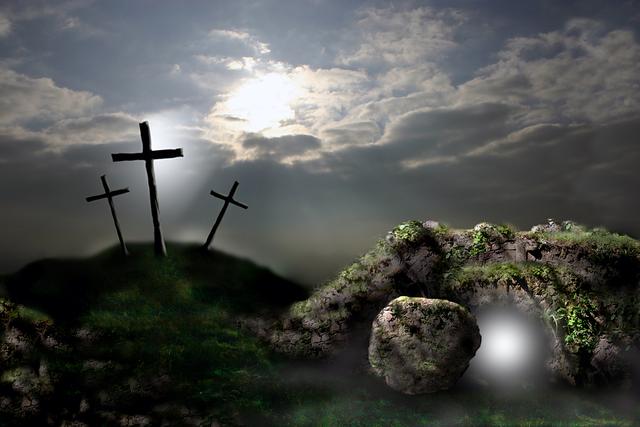 The Perfect Death There are all kinds of things happening all around us. There is the Corona Virus and we have watched the death toll mounting over the past months. This is Memorial Day. We take time today to think about those who laid down their life for the sake of our freedoms. We know that anything could happen at any time. Even if it is not from the things we fear right now, we are mortal. Our lives are limited. It is not a good answer to ignore the fact. Covering up by indulging the flesh leaves us unprepared. Chasing after everything in this world leads to us being surprised by our mortality and facing it with fear and panic. For centuries, for generations people have talked about what is a good death. We are blessed. As Christians, we have Jesus. He is the only one who came into the world for the expressed purpose of dying. It was His mission, to lay down His life and to take it up again. "This charge" He said, "I have received from My Father." (John 10:18) Jesus died the perfect death. Not just a good death; it was the perfect death. Yes there was fear and trembling. As He prayed in Gethsemane there certainly was fear of the Cross, the separation and forsakenness, and surrendering His soul into death. But Jesus is the Author and Perfecter of faith. He holds on to the words and promises of God. In fact, Jesus simply and stubbornly believes. If His Father has promised that after death there will be an Easter; then that just simply is how it will be. All of the terrible things that happen do not change the promise. And Jesus faced down every one of them just like out in the wilderness, "It is written, 'Man shall not live by bread alone, but by every word that proceeds out of the mouth of God.'" (Matthew 4:4) The promises were specific;
Jesus held to the promises of His Father believing and trusting, all the way to the cross, surrendering His life and soul into death. Jesus doing that is like the one professor in seminary said to us. "Remember, Jesus going to the cross was also an act of worship." Stephen, the first martyr followed Jesus. His prayers echo two of Jesus' prayers from the cross. "Lord, do not hold this sin against them", and "Lord Jesus, receive my spirit." (Acts 7:59-60) Stephen's death also was an act of worship. So for us. We have words and promises of God. They are given for us to believe and hold on to in the face of everything that happens. And the promises are clear:
Jesus knows that we need His promises. He gives the promises to bring us to faith and strengthen us in faith. After all He is the Author and Perfecter of faith. As our Shepherd Jesus leads us through the valley of the shadow of death. He has been there. He is able to guide and keep us, because He has faced death and He has won the victory. Lord Jesus, speak Your promises to me that I may grow in walking by faith. Remind me of Your promises that I may remember them in all my times of trouble. And hold my soul by Your promises when my dying day comes; that Your promises may guide me through dying and into living forever. Amen. 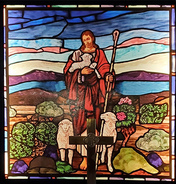 The Praying God There are things Jesus does that no other god could do. One of those things is to pray. None of the "gods" that human beings have thought of and worshiped is involved in praying. Praying means to look to someone else as God; and then to humble yourself and ask someone who is almighty. For Jesus to pray means that He takes the humble place, stands with us, and kneels down as a genuine human being. Think about it. No other theory of what God might be like has God kneeling down in humility. And someone would ask, "If God prays, who does He pray to?" They would be right to ask that question. But Jesus does things that God is not "supposed to do." He refuses to stay where God is "supposed to belong." So there He is hanging around the poor, the diseased, the sinners; and there He is teaching things about God that the rabbis had no idea of; and there He is praying. Early in the morning (Mark 1:35); out in the wilderness for 40 days while being tempted (Luke 4:1); offering up the mealtime prayer for 5 loaves and 2 fish (Mark 6:41); rejoicing at the kingdom being open to little children (Matthew 11:25-26); after feeding the 5,000 when the crowd wanted to make Him king (John 6:15 & Mark 6:46); and before asking the disciples who He is (Mark 9:18); are just some of the places and patterns of Jesus' prayers. As odd as it sounds, Jesus is the praying God. This is a wonderful and absolutely amazing truth. Jesus does not dabble in prayer. He prays, deeply, from the heart, calling out, pleading for our salvation, agonizing in the struggle, and submitting when His Father said "No." In the upper room Jesus told Peter that Peter's salvation was in danger. "Simon, Simon, behold, Satan demanded to have you, that he might sift you like wheat, but I have prayed for you that your faith may not fail." (Luke 22:31) In the Garden of Gethsemane Jesus prayed with such agony that His sweat became like great drops of blood. (Luke 22:44) The Letter to the Hebrews describes it as, "Jesus offered up prayers and supplications, with loud cries and tears". (Hebrews 5:7) And after three times asking His Father to take away the cup of suffering, Jesus then went to arrest, trial and the cross. Jesus prays. To the full measure He prays, knowing the glorious answers and the prayer that seems to meet with silence. Jesus prayed -- as one of us with all that means. But even as Jesus humbled Himself in obedience "unto death, even death on a cross" (Philippians 2:8); with the prayers that came from the cross, "Father forgive them ..." and "My God, ... why have You forsaken Me?" -- that does not change the fact that He is God. Jesus stilled the storm, healed the sick, sometimes with only a command, and raised Lazarus from the dead (after, by the way, having an intimate, deliberately overheard, conversation with His Father about what they were doing). (John11:41-42) The Athanasian Creed says, "Equal to the Father, according to His Godhead" Why then, in Jesus, do we find God doing such uncharacteristic things for God. The answer is wonderful. Jesus became one of us so He could know human life and do human things. Those human things still include: He prays and He worships. During His earthly ministry Jesus walked by faith. So we have an amazing privilege. As Christians we get to pray to the God who doesn't just listen to prayers; He prays like us and joins in praying with us. Who better to bring your prayers to; than The Praying God, the One True God who knows prayer from this side of it. It is an astonishing step, a thing never imagined in the whole history of human beings crafting and designing religion. But there it is. God has done the unimaginable. Jesus is the Praying God who hears prayers as only a praying God can. Lord Jesus, thank You for being one of us, for being my Brother even as You are my Savior; for hearing my prayer and joining Your prayer together with mine. Lead me in prayer and help me to grow in prayer, trusting Your promises and praying both for my neighbor in his need and for the simple joy of praying, hearing Your words, praying, praising and giving thanks. Amen. 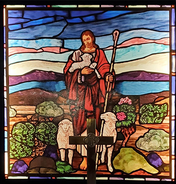 The Everything Man It is two days since we celebrated the Ascension, and we are celebrating that we have a brother, Jesus, who is at the throne of God and ruling heaven for our blessing. It is important -- Jesus the human rules. Jesus the God-man has been given all authority and power. It was Paul who said, "To the Jews I became as a Jew, in order to win the Jews. to those under the law I became as one under the law ... . To those outside the law I became as one outside the law ... that I might win those outside the law. To the weak I became weak, that I might win the weak. I have become all things to all people, that by all means I might save some." (1 Corinthians 9:20-22) Where did he learn this? Answer: The same place he learned everything else about the Gospel. From Jesus. Jesus is the Everything Man. You begin to learn this as you watch Jesus calling four fishermen, one tax gatherer, a revolutionary zealot and others. As He begins His ministry you see Nicodemus, a scholar and teacher coming to Him and "tax gatherers and sinners all ... drawing near." (Luke 15:1) The pious sisters Mary & Martha follow, as well as Mary Magdalene, whom Jesus freed from demons. (Luke 8:2) And then the list expands. Lepers, a man born blind, a sinful woman, a rich young man, a teacher of the Law; Jesus moves through every part of society bringing words of comfort, redemption, spiritual life and peace with God. Children are comfortable with Him, and Jesus relates easily. He knows them, and they know there is the mercy and peace from God with Him. And we see in church that they still are comfortable where Jesus is. There is a saying, "What He did not become, He did not save." It is a quick summary of the Bible's teaching about Jesus, God in the flesh, God with us. Jesus rejoiced over those coming to faith, was angry with the money changers, loved His disciples (John 13), was frustrated with the stubbornness around Him, and wept outside Lazarus' tomb. In every situation I encounter He is the Friend who is able to empathize because He knows the problems and joys we experience. All other religions send prayers up to the heavens and hope to be heard. We have a Savior who walked among us and knows, personally. There are times in life when we long for, struggle to find, and are lonely without someone to share, where we can connect on a personal level. Jesus is the one who knows and sees and understands every part of the human experience -- and is able to "sympathize with our weaknesses" because He "has been tempted in all things as we are, yet without sin." (Hebrews 4:15) Even to the uttermost -- Jesus knows what it is like to carry sin, to be separated, and to die with the sins of the world on Him. Because He carried the sins we get to come to a Savior who already knows, and wanted us to be set free and be with Him forever. This has been the experience of Christians through the centuries. With every part of our life there is Jesus who understands because He is one of us. In fact, in nation after nation and culture after culture Christians all around the world find the same truth. I have had opportunities to sit, talk, journey and share with Christians in South Africa and Botswana; and Christians from Ethiopia, Korea, and other places. We find that we share this same truth. Jesus understands. He knows the joys and troubles of our souls. He knows because He is one of us. It does not matter how different our lives or our cultures have been. Jesus is the same. He understands. He knows because He is one of us. And then, because He is one of us he hears our prayers in a different and very distinct way. This is different than any other religion. It is different than how it would happen if God were, like the song said, "just a God who didn't care, who lived a way up there". In every part of life I find that Jesus is close at hand and there is "grace to help in time of need." (Hebrews 4:16) Jesus is indeed "The Everything Man." He is everything to me, and to countless Christians of every time and every place. Lord Jesus, thank You that I can come to You and find in You a Friend who understands; and have in You a God who hears my prayers with such knowledge of what it is like to pray. Thank You for walking this earth, knowing the days and hours, the joys and sorrows, the hopes and fears that I face. Walk with me, Lord. Lead on. Lead on through everything, and on to when I get to see You face to face. Be close by my side now that I may be with You forever. Amen. 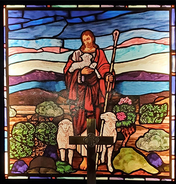 The Gap Between This is the first day after Ascension Day. The disciples saw Jesus ascend into heaven. They heard the angels explain, “This Jesus, who was taken up from you into heaven, will come in the same way you saw Him go into heaven.” (Acts 1:11) Now what? They had heard Jesus tell them to wait. “Stay in the city until you are clothed with power from on high.” (Luke 24:49) Wait. Until what? We are heading into Memorial Day weekend; and there is an old saying, “War is long periods of boredom punctuated by moments of sheer terror.” All through life there are the in-between times and those times are full of waiting. Day 1 – of the wait in between Jesus’ Ascension and whatever was coming next, and they did not know what it was. How do you wait? How do you fill the in-between? Sometimes the in-between stretches on and on.
How did the disciples fill the in-between? Luke tells us they “were continually in the temple blessing God.” (Luke 24:53) That’s pretty good! Seeking out the will, words, and promises of God; spending time in prayer, praise and worship is exactly what they needed to do. They were in-between, and they did not know what direction God would send them, or what He had planned for them. The only way to prepare was to spend time with God. Do you realize there is a far more profound example? There was an in-between, between infancy and twelve years old, and another in-between, between twelve years old and about thirty years old. In that in-between Jesus “increased in wisdom and in stature and in favor with God and man.” (Luke 2:52) Growing up and searching the Scriptures was the pattern for Jesus Himself. And then the in-between continued. No matter how busy things became Jesus went out to take in-between time. The Gospels tell us how He went out early in the morning for prayer (Mark 1:35) , and after feeding the 5,000 went up on the mountain at the end of the day to pray (Matthew 14:22-23) . Isaiah describes how important the in-between time was for Jesus, “Morning by morning … He awakens My ear to hear as those who are taught.” (Isaiah 50:4) Taking in the Word of God, Jesus was prepared to do the will of His Father, the great works of salvation. Again, Isaiah prophesies, “The Lord God has given me the tongue of those who are taught, that I may know how to sustain with a word him who is weary.” (Isaiah 50:4) Out of the in-between time Jesus comforted, strengthened the weary, healed the sick, raised the dead, and finally carried the sins of the world to bring us salvation. Jesus taught His disciples, and by His teaching they spent their in-between time in worship, searching the Scriptures, and prayer. On the tenth day came the day of Pentecost and preaching the Gospel. And now a whole lot of us have in-between time. How are we doing? How is our waiting? How are we filling the in-between time? We do not know what is coming next. How are we preparing? Lord Jesus, guide my moment and my days. Lead me into Your word. Help me to be diligent, looking deeply into Your will, and Your promises. Guide me in repentance and faith that I may be focused on the things of life, eternity, and salvation. As You prepared day by day to strengthen the weak and comfort the distressed, send me also to speak Your words of mercy to hearts needing to hear Your comfort. Amen. 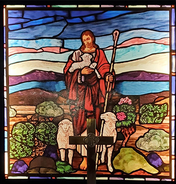 Held in Trust It’s an interesting Psalm, partly because it does not seem to ring true; and when that happens in the Bible we might be on our way to an insight. Psalm 8 says, “what is man that You are mindful of him, and the son of man that You care for him? Yet You have made him a little lower than the heavenly beings and crowned him with glory and honor.” (Psalm 8:4-5) And now here comes the kicker, “You have given him dominion over the works of Your hands; You have put all things under his feet, all sheep and oxen, and also the beasts of the field, the birds of the heavens, and the fish of the sea, whatever passes along the paths of the seas.” (Psalm 8:6-8) You might say, “Well, that would be nice. All the beasts of the field? ‘Hey bear, leave that alone,’ and it does? ‘Hey deer, come on over here,’ and it does? ‘Hey fish, jump in the net, OK?’ But you know, I haven’t seen any of that lately.” You would be correct. That’s why so many interpretations of Psalm 8 say, “this is obviously about Jesus.” Yes, it is, and that is a good beginning. But we should not stop at the beginning. This is Ascension Day and this psalm has a lot to do with the Ascension of Jesus. Jesus is the Son of Man, and for a while He took a place lower than the heavenly beings. He was born and made Himself part of the flesh, blood, bone and skin collection of human beings – one of us. Paul says, “He did not consider equality with God something to be grasped, but emptied Himself, taking on the form of a servant …” (Philippians 2:5-11) But even as Jesus took on our lowly nature, the world of nature was coming back into harmony with Him. Mark tells about the temptations in the wilderness like this, “He was in the wilderness forty days, being tempted by Satan. And He was with the wild animals, and the angels were ministering to Him.” (Mark 1:13) Jesus was restoring the original pattern of creation, standing in our place. In His person Jesus restored the proper relationship between mankind and nature. Jesus holds that in trust for us until the day of the resurrection when we are glorified. Jesus went further. “He became obedient unto death, even death on a cross.” (Philippians 2:8) And as Jesus laid down His life, the natural world responded. Matthew reports, there was darkness for the tree hours, and “the earth shook and the rocks were split.” (Matthew 27:45, 51) But then there is the victory. "Therefore God exalted Him to the highest place and gave Him the name that is above every name." (Philippians 2:9)The whole creation joins in praising Him. (Revelation 5:13) I haven’t even named the verses that talk about wind, waves, water, wine, bread, fish, and a fig tree. All of creation is subject to Jesus. In fact, the whole creation longs to be subject to Him. “… the whole creation has been groaning together in the pains of childbirth until now.” (Romans 8:20-22) But once again this is Ascension Day. We are celebrating that Jesus (our brother) ascended (as our brother) into heaven. He rules all things and God has given Him the name above all names – and He is still our brother. When the Psalm says “son of man” (Psalm 8:4) it is calling Jesus your brother. When it says, “You have put all things under His feet …” (Psalm 8:6-8) it is calling you His brother or sister. You see, the victory He won; He won it for you. And Jesus has taken the place of glory, but the glory of Jesus is to make us glorious. There is a part of the letter to the Hebrews that meditates on Psalm 8. It says He “was made lower than the angels … that by the grace of God he might suffer death for everyone.” And then it talks about, “bringing many sons to glory” and says, “That is why He is not ashamed to call them brothers …” (Hebrews 2:9-11) Jesus has dominion over the created world. But He does not hoard dominion for Himself alone. What Jesus holds He holds for you. He holds it in trust until the day when He can bring us all into glory and fully share the glories and blessings with us. The ascension and glory we celebrate today is actually a promise of our future. Like Paul says, we “groan inwardly as we wait eagerly for adoption as sons, the redemption of our bodies. (Romans 8:23) The apostle John joins in and says, “when He appears we shall be like Him, for we shall see Him as He is.” (1 John 3:2) Lord Jesus, fill my vision this day with the promises You have given, that one day I will see Your glory and share in the blessings of eternal life. One day You will bring me into the full glory You have prepared, and I will celebrate and sing, and then live forever. Right now, in the middle of following You, help me to live in hope, and trust You for each of the days that come along. Amen. |
Rev. Mark WilligPastor Willig is pastor emeritus of Friends in Christ Lutheran Church. Archives
December 2023
Categories
All
|
 RSS Feed
RSS Feed